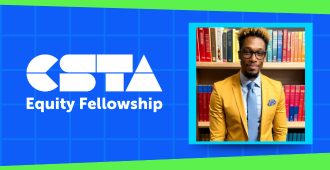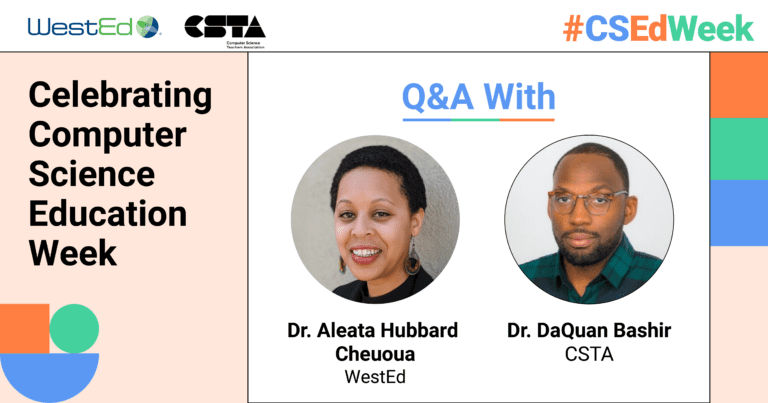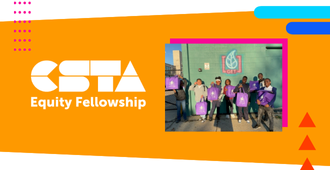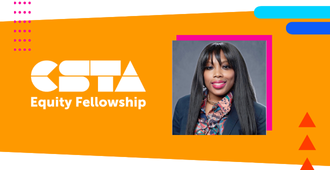Victor “Coach” Hicks is the founder and owner of Coding with Culture, an Atlanta-based organization that offers CS classes, educator training, and impactful community partnerships, all with the goal of building a “Kindergarten through HBCU” pathway for computational and design thinking. A fervent advocate for HBCUs and other minority-serving institutions (MSIs), Victor is dedicated to culturally responsive and sustainable pedagogy as tools for revolutionizing STEM education. He has been recognized in Forbes, and he has presented his work at numerous national and international educational technology conferences. He is also the chair of the Youth Outreach Committee and a member of the board of directors for Decatur Makers.
“Coming from the Diasporan (Black) and LGBT communities,” says Victor, “my lived experiences inform my commitment to breaking down barriers and building bridges.” He maintains a particular focus on supporting Black women and girls to overcome the barriers that have led to their systemic underrepresentation in computer science. Through Coding with Culture, he partnered with several Atlanta metropolitan area schools and youth programs, which serve a majority-Black population of K–8 students, to craft a dynamic computer science curriculum that encouraged students to envision themselves as leaders and innovators in the technology fields. Victor notes that many of the students went on to choose HBCUs and MSIs for their college education.
Victor makes a point of creating a safe, open culture in which students feel comfortable sharing their experiences. As a member of the LGBT community, he was able to be an ally to other LGBT+ students, and he works hard to “foster an environment where they feel heard, valued, and empowered in their learning.” This environment, in turn, leads to better classroom discussions, more robust student participation, and positive feedback on the experience from his students.
Victor extends his personal impact by offering training to educators serving marginalized student populations, especially in Black communities. Coding with Culture makes use of the principles of the Abolitionist Teaching Network, as well as the Kapor Center’s Culturally Responsive-Sustaining Computer Science Education framework, to ensure that Black history, culture, and excellence are foregrounded and honored throughout his educational practice. As part of his commitment to creating “equitable, joy-filled learning environments” for Black students, Victor created a unit called “Design a Minecraft HBCU” that weaves HBCU institutional history together with technical learning. Such efforts are designed, he says, to “nurture a profound sense of belonging and identity, anchoring students’ engagement in a broader social context.”
The work doesn’t stop at the classroom. Victor maintains a longtime partnership with InspiredU, an organization attempting to combat Atlanta’s digital divide through workshops and distribution of tech hardware. He partnered with the Pinky Cole Foundation to sponsor Black female students to participate in CodeHouse’s Tech Exposure Day. He’s also partnered with Mr. Odie Gray, and with the Diversity Cyber Council which provides free computer science workshops and trainings to teens and young adults from the Atlanta area who might not otherwise have access to such opportunities. Victor’s organization, Coding with Culture is also partnering with Decatur Makers to provide over 500 scholarships for Google Career Certificates in 7 areas through Grow with Google’s partnership program.
Victor wants to use his time as a CSTA Equity Fellow to acquire new skills and tools to support computer science education for marginalized groups. He says, “I am committed to using this fellowship to amplify my advocacy voice and drive change for historically excluded communities.” The importance of collaboration with like-minded peers has always been key to his practice, and he can’t wait to learn from and with his cohort. He hopes to build new connections among the many organizations working to bridge gaps in equity.
Continuing his work with HBCUs, Victor hopes to develop a professional development series tailored to pre-service teachers studying at HBCUs, to ensure that new teachers will understand how to incorporate computer science and computational thinking into their classrooms. He would also like to curate a database of women working in CS and STEM fields as a means to connect Black and Brown students with professionals who share their identities. Finally, he’s eager to raise awareness of CS and tech news from HBCUs through an increased social media presence or even a podcast. He says, “Raising awareness about HBCUs as viable pathways to tech careers will help students from underrepresented backgrounds see these institutions as supportive environments offering excellent opportunities in the tech field.”
Victor’s excited to keep pushing for systemic change in CS education, with the collaboration of his cohort. He recognizes that “achieving equity requires collaboration and partnerships—a systems-level approach that acknowledges the interconnectedness of all communities,” and he hopes to forge those connections during his fellowship.




